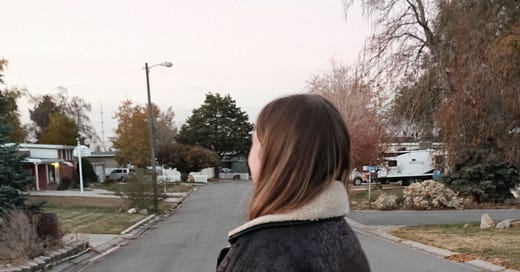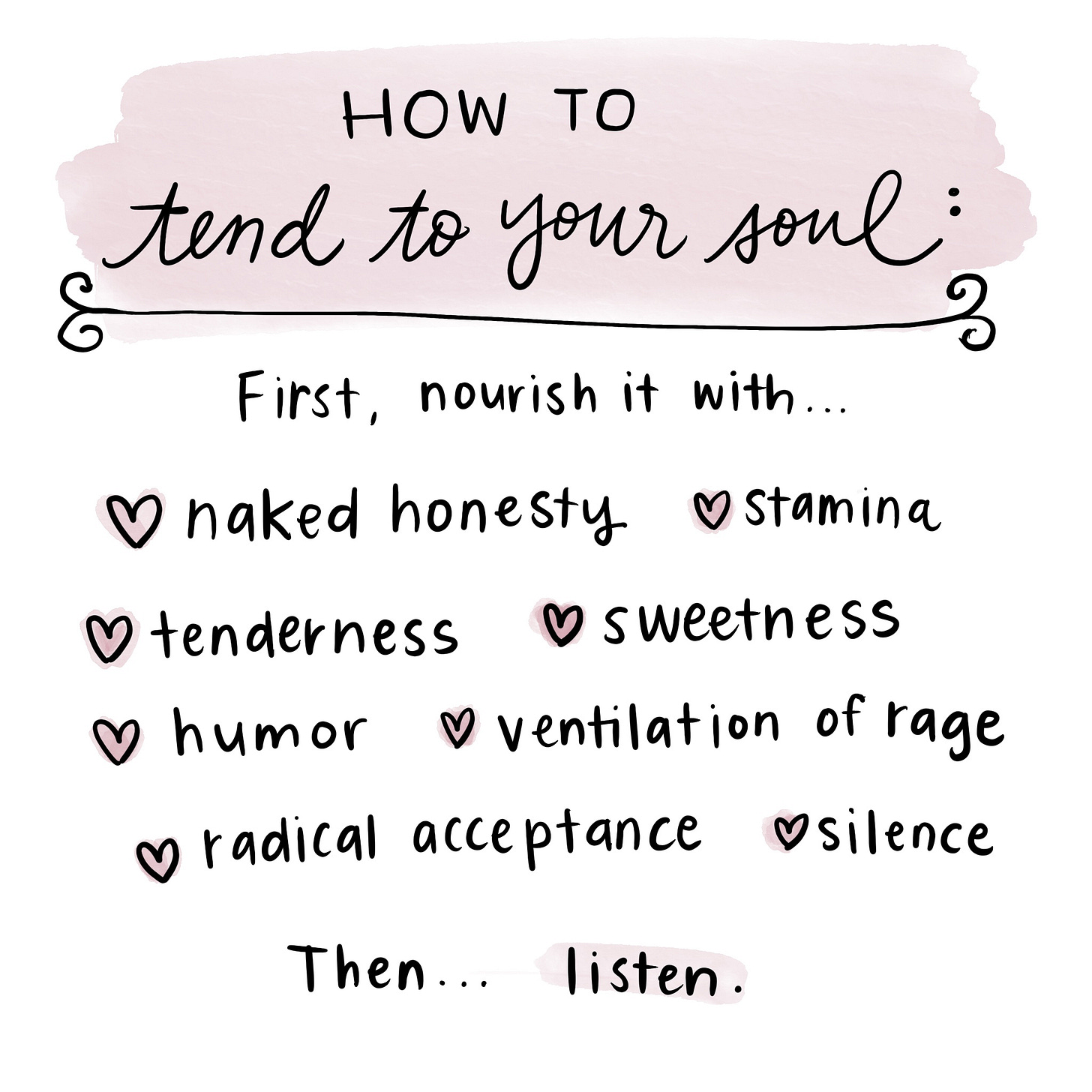Something for Sundays reflects my personal journey in an evolving faith. Often, my writing wrestles with Mormon theology and tradition and may challenge some beliefs. If you're not in the right space to read this today, I understand, I do not fault you, and I am so grateful you subscribe anyway. :)
One of my friends recently asked me, “With all your deconstructing and questioning and doubting, why do you still… go to Church?” Today I will attempt to answer this question in a way that was better than my jumbled answer to her. :)
Many of the people I know/people I see online who have left the LDS Church, often leave all religion, too. I get it. They follow the deconstruction pipeline — first Mormonism, then Christianity, then religion as a whole, then God. Seeing this pattern was a big reason I put off questioning things in Mormonism for so long. I wanted to stay far far away from this deconstruction pipeline (that I heard talked about in whispers as the slippery slope).
As someone who has always had a deep appreciation for spiritual things, I felt afraid to lose that part of myself and my life.
For me, my “deconstruction pipeline” wasn’t a pipeline at all. I wasn’t on a train that made different stops: get off here to deconstruct Mormonism, and if you’d like to keep going, get back on the train to hit the next stop of deconstructing Christianity!
My deconstruction process looked more like this:
It wasn’t a neat and tidy process. Mormonism, Christianity, religion, and God were all tangled up together — a mess of beliefs and personal experiences and tradition and scripture and interpretation of scripture and reasoning and justification and shame and ignorance and tender faith. I couldn’t tell apart what was Mormonism, what was God, what was religion, what was Christianity. It all was enmeshed together.
I’ve heard people in the Ex-Mormon space say that Ex-Mormons who trade Mormonism for some form of Christianity are trading Star Wars for Lord of the Rings (in other words, trading fake for fake). They see those people giving their allegiance to one group, getting hurt, and then turning around and immediately giving allegiance to another group. But I think it’s more complicated than that.
I haven’t wanted to fully assume the identity of someone who has “left the Church” — because what does that really mean? And what if I think it means something different from what someone else thinks it means?
When I was still very believing and active in the LDS faith, one of my friends who hadn’t attended for a while told me she still hadn’t decided whether or not to “leave the Church.” I was surprised. In my mind, she already had.
“What does leave the Church mean for you?” I wanted to know. It turns out, her answer was totally different than mine. And my answer might be different than yours.
When people “leave the Church”, whatever that means, that inner need to be accepted into a group does not just go away. It’s why podcasts like Girlscamp or Mormon Stories and forums like Ex-Mormon Reddit are so popular — people need to be with other people who get it. They want to feel part of a community and a group in some way, one that can acutely understand why it feels so awkward to wear a tank top out in public, and why a coworker asking “Are you Mormon?” can feel so complicated.
My first time trying coffee was disappointingly uneventful. It happened one day after work. It was fall, the leaves were changing colors, and Starbucks released their annual autumn flavors. And I thought, “Why not?” So I ordered my drink, tapped my foot in nervousness that I would become addicted for the rest of my life, and then took a small sip. BLECH! It was disgusting!
It wasn’t until two or three other times of trying a variety of the sweetest coffee drinks I could find that I decided to face something in myself: I just… didn’t like coffee.
How embarrassing! A post-Mormon who doesn’t like coffee?!
But then, curiously, I met some people who were never Mormon who also just… didn’t like coffee. I was perplexed. But they didn’t grow up Mormon. They could have coffee!
The perplexity came again when I met a young married couple who had never been Mormon, in fact, they weren’t even religious. People outside of Mormonism want to get married young? I thought. Or when that same couple told me that they wanted to have a baby (“I’ve always wanted to be a young mom,” the wife explained). In my mind, only Mormons wanted to be young moms.
After I stopped wearing garments, and started branching out in the styles of clothes I wore, I remember crying in a dressing room filled with an assortment of tank top styles. In a weird way, I felt ashamed wanting to just wear a t-shirt and long pants in the summer when I didn’t “have to” anymore.
I realized that my shame that had been born in trying so hard to be a perfect Mormon had transferred into trying to be a perfect Ex-Mormon. I didn’t want to go to Starbucks and order a hot chocolate! What if they thought I was still a full-in, believing, super Mormon?
But also. What if they just thought I liked hot chocolate?
But also. Who cares?
I’ve slowly realized that a Mormon saying “My way of life is true and yours is not” is just as wrong as an Ex-Mormon saying “My way of life is true and yours is not.”
They’re both worshipping the same thing: certainty.
So far, I’ve attended church services for Unitarian Universalist, Baptist, Methodist, Catholic, Episcopal, Non-Denominational, and Greek Orthodox. At the beginning of exploring new faith traditions, I admit that I was following Joseph Smith’s footsteps in trying to find the “right” or the “correct” theology. When attending the services, I’d mull over in my mind, “Is the Trinity right or the Godhead right? Are we saved by works or grace? Is baptism necessary? Is heaven literal or symbolic?”
I still think those topics are interesting, and even important, but not the most important to me anymore. Exploring a variety of faith traditions has opened my mind to new ways of worship — it’s why I’ve found myself jumping up and down singing along to a Christian rock band, and sitting alone quietly beading a rosary.
What I’m realizing is that my deconstruction process has been less about deconstructing specifics of theology and religious practices and more about deconstructing certainty.
It’s why, when I go to a new Church, and tell them I am exploring options outside of Mormonism, I cringe when they say, “I’m so glad that God saved you from darkness and destruction!! I am so sorry you were deceived by the Devil!!!” (True story)
Even though their theology and practices may be different from Mormonism, their beliefs, in reality, are the same: We-are-right-and-you-are-wrong. Dualistic thinking. Correctness. Pity.
Unfortunately for them, and fortunately for me, that rhetoric doesn’t work for me anymore.
Despite it all, I’ve consciously wanted a faith community. Maybe Ex-Mormons see me and think, just as I thought of that never-Mo married couple, “People outside of Mormonism want a faith community? But you don’t have to do that!”
They’re right. I don’t have to have a faith community. So, why?
To be honest, I don’t know the complete “why”. I like the things that come with church — I like the multigenerational community, where I can have friends that are 5 and friends that are 85, I like participating in service projects, I like the rhythm that a weekly worship brings to my life, I like meeting others who also think that there’s more to this world than what we can see with our two eyes.
But the true story is this: I tried to not go to Church (granted, that only lasted two weeks) and I could feel my soul shrinking. She cried out, “I want a spiritual home!!!” and so, I listened.
I can’t explain it — my soul has peculiar requests sometimes. But I tend to her gently, and she tends to me in return.
May your week be filled with such gentleness,
















This topic has been rattling around in my brain for years, as I've been in a similar spot as you. You brought it to light so beautifully, alongside your personal experience and perspective. My favorite line: "They’re both worshipping the same thing: certainty."
Thanks so much for sharing. I love your perspective here. There are so many beautiful things that come from attending services and finding a spiritual community. I myself started attending friends meetings (quaker meetings) this year, and, oddly, it’s helped me to remember all the things I once loved about Mormonism. It’s a joy to sing hymns, to break bread with strangers, and to find like-minded folks (or different-minded folks lol). I’m so glad leaving Mormonism doesn’t have to equal losing all of that. I love that you are breaking binary thinking and finding a path that is completely your own. Keep sharing your journey. It’s a gift to all of us who navigate that messy ball of belief and belonging. ❤️